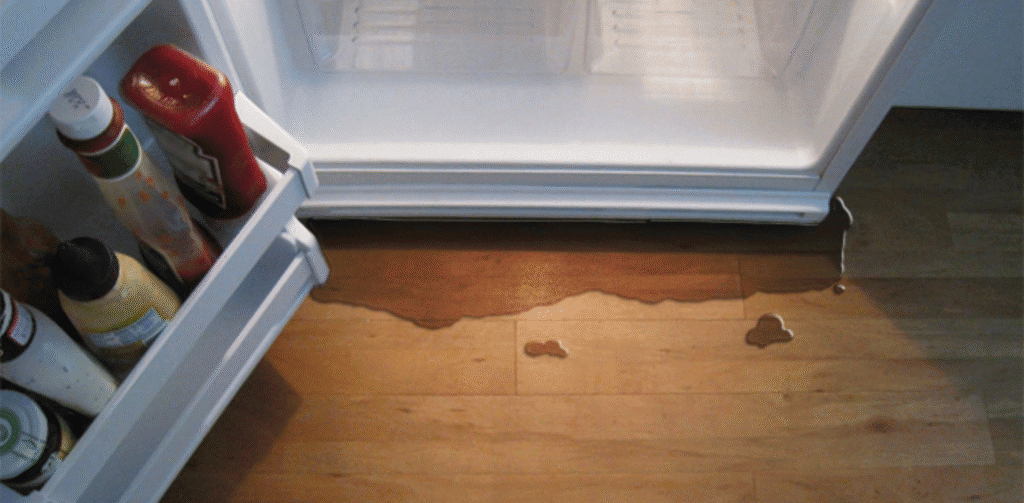Your fridge’s humming sound is likely due to compressor issues, fan problems, or motor malfunctions. Start by checking for any obstructions in the fan and make sure the motor’s capacitor is functioning properly.
Bring focus next to the compressor; clean around it to improve efficiency and reduce noise. If these fixes don’t help, tightening loose parts and cleaning debris from coils may alleviate the sound.
Remember, if the noise persists, it’s wise to consult a professional to prevent further damage. Taking these steps not only minimizes the noise but also enhances your fridge’s performance and lifespan, offering more insightful tips ahead.
Common Causes of a Humming Noise in Your Fridge
If your fridge is humming, it’s often due to compressor issues, fan problems, or motor malfunctions.
You’ll need to check the compressor for any signs of damage or unusual operation, as it’s essential for cooling your fridge efficiently.
Moreover, inspect the fan and motor for obstructions or wear, which can also cause a disruptive noise.
Compressor Issues

Your fridge’s humming sound often originates from compressor issues, typically due to its overworking or wear and tear.
When the compressor works harder than it should, it can create a distinctive hum that signals it might be time to guarantee.
To address compressor noise, start by inspecting the unit for any signs of damage or excessive buildup that could be straining the compressor. Cleaning around the compressor can reduce noise by improving its efficiency.
However, if the noise persists, consider the repair costs; sometimes replacing a faulty compressor is more cost-effective than extensive repairs.
Always consult a professional to make sure that the issue is accurately diagnosed and handled properly, preserving the longevity of your refrigerator.
Fan Problems
Another common source of humming in your fridge can be fan problems, often due to blockages or motor issues. If you’re hearing unusual sounds or feeling excessive vibration, it might be time to check the fan.
Next, consider lubricating the fan motor to make sure it runs smoothly. A well-lubricated motor is less likely to produce annoying vibrations.
Start by inspecting the fan blades for any obstructions like accumulated dust or debris. Simply removing these blockages can greatly reduce noise.
Also, tightening screws around the fan area can prevent any loose components from contributing to the noise. By addressing these issues, you’ll not only quiet down your fridge but also extend its lifespan, keeping you and your trusted appliance in harmony.
Motor Malfunctions
Beyond fan issues, motor malfunctions also commonly cause your fridge to hum. If you’ve ruled out the condenser fan and evaporator fan as culprits, consider the motor itself.
Fridges often use types like the split-phase motor, capacitor-start motor, or permanent-split capacitor motor. Issues in these motors, such as a failing Embraco compressor motor, can lead to that persistent humming sound.
First, check if the motor’s capacitor is functioning properly; a faulty capacitor can prevent the motor from starting smoothly, leading to a hum. If it’s the capacitor, replacing it isn’t too complex.
If the motor itself is damaged, you might need professional help. Remember, you’re not alone in this—many fridge owners face similar motor troubles.
Troubleshooting Steps to Fix a Humming Fridge
If you’re dealing with a humming fridge, it’s crucial to tackle the issue step by step.
First, you’ll want to check if the noise is coming from the back, which could suggest a problem with the compressor or its components.
Evaluating and tightening any loose parts can often resolve the humming, ensuring your fridge runs smoothly again.
Step-by-Step Troubleshooting
To address the humming noise from your fridge, begin by checking the compressor for any signs of damage or unusual operation.
Next, inspect the fans to make sure they’re not obstructed or faulty.
Checking the Compressor
Check the compressor by first unplugging your fridge and locating the compressor at the back or bottom. Make it a part of your regular maintenance to inspect this key component of your fridge’s cooling system.
A faulty compressor can disrupt the refrigeration cycle, leading to mechanical issues. While you’re there, glance at other elements critical in appliance maintenance, confirming all is in order before moving on.
Inspecting the Fans
Examine the fans in your fridge to make sure they’re not contributing to the humming sound. Check the cooling fan, circulation fan, and blower fan for any issues like a fan blade hitting something or loose motor mounts.
Confirm there’s no vibration against walls. Sometimes, a bit of lubrication can quiet things down.
You’re part of making your home a peaceful, well-functioning space.
Examining the Motor
After thoroughly checking the fans, shift your attention to examining the motor, as it could be the source of your fridge’s humming sound. Delve into component inspection; listen for abnormal sounds like electrical buzzing that hint at issues.
Is the compressor rattling? These signs suggest the motor might be failing. Addressing this early can prevent more extensive repairs later, ensuring your fridge runs smoothly and quietly again.
Preventative Maintenance Tips

To keep your fridge running smoothly and prevent that annoying humming sound, it’s important to maintain it regularly. Start by cleaning the coils and interior spaces every few months to guarantee proper airflow and efficiency.
Also, inspect your appliance for any signs of wear and make sure it’s properly installed to avoid any operational issues.
Regular Cleaning
Consistently cleaning your fridge’s coils and interior surfaces can greatly reduce unexpected noises and extend the appliance’s lifespan. Over time, dust and debris accumulate on these coils, leading to performance issues that maximize the system’s efficiency. By regularly removing this buildup, you guarantee ideal airflow and performance, preventing the fridge from overworking.
Don’t overlook the importance of tightening loose parts and verifying proper installation during your cleaning routine. These steps can ward off many common fridge malfunctions. If these tasks seem daunting, consider professional servicing to maintain your appliance in peak condition.
You’re not just preserving a machine; you’re ensuring a smooth-running home where everyone feels the comfort of reliability.
Timely Inspections
Scheduling regular inspections for your fridge helps pinpoint potential issues before they escalate into costly repairs. You’ll want to focus on checking the compressor and verifying the power supply. These are essential steps in ensuring your appliance operates efficiently and quietly.
During the inspection, listen for an acceptable noise level; excessive humming might suggest a problem with the compressor or evaporator.
Don’t hesitate to seek expert help if you’re unsure about the technical aspects. Professionals can assess if your fridge has energy-efficient compressors, which not only reduce noise but also lower energy bills.
Proper Installation and Usage
Make sure your fridge is installed level and in a well-ventilated area to prevent mechanical strain and enhance its efficiency. It’s important to keep the area ventilated, allowing your fridge, whether it’s a reciprocating or rotary type, to dissipate heat effectively.
Regularly perform a power supply check to make sure your fridge is receiving the correct voltage and isn’t at risk from unstable power sources. Using surge protectors can safeguard your appliance from sudden spikes in voltage, potentially extending its lifespan.
Avoid overloading your fridge as it impedes air circulation inside, which can increase energy consumption and strain the compressor. Proper placement isn’t just about space—it affects your fridge’s energy efficiency and noise levels. Being mindful of these aspects helps you and your fridge thrive together.
When to Call a Professional
You should call a professional if the humming sound from your fridge persists despite your basic troubleshooting efforts. This is particularly important if you notice other worrying noises like clicking, buzzing, whirring, or clanking. These sounds can indicate more serious issues with your device, such as problems with the freezer’s compressor or the ice maker’s mechanics.
Don’t hesitate to reach out for expert help. It’s comforting to know you’re not alone in this. A trained technician can accurately diagnose and resolve underlying issues, ensuring your fridge operates smoothly and efficiently. Ignoring these signals can lead to bigger, costlier problems down the road. It’s better to be safe and let a professional take a look.
Need Repairs Fast?
Same-Day Technician Visits Available











